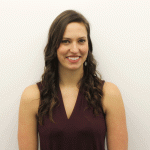 By Tori Etheridge, Physiotherapist
By Tori Etheridge, Physiotherapist
When I first graduated from MPT school, I was the typical eager, over-excited and driven new grad. I couldn’t wait to get out there and work with people. I spent my first few years trying everything including acute medical, high acuity, emergency, outpatient rehab, private MSK, and neuro. This is one of the great, yet challenging parts of our profession–the opportunities are endless. Physiotherapy can be defined in so many ways and we have such a vast array of skills that can be utilized in a variety of settings.
At times I felt frustrated. After all the years of school I felt unsure about what I wanted to do and felt I was still not skilled enough to work in any particular area. After speaking with fellow classmates, I think this can be a common feeling. There are some who know exactly what they want to do and where they want to work, but for those of us who don’t it can be a little overwhelming.
From these experiences, I have learnt a few things that I would like to pass along to new grads:
1) Try everything
The more experiences I had, the more I learnt about myself as a practitioner and the type of treatment approaches which worked best for me and those that did not. New opportunities that come your way can seem intimidating, and a lot of the time we may feel we aren’t good enough or know enough to take them on. The truth is, we may actually not have the skills or knowledge yet but we definitely have the training to problem-solve, think critically and figure it out. As long as we are honest about our skills and willing to learn, there is a lot we can achieve. My “try everything” mentality was put to the test when I found myself on my way to Africa with a suitcase full of prosthetics not knowing at all what to expect or how to prepare. It was here I learned many lessons, importantly, how to communicate and learn from other people and cultures who approach rehabilitation differently. I have my goals, and the patients have theirs. Its important to take the time to ensure we understand what our patients need from us, even if its not what we think they need at that moment. If you take the time to truly listen to your patient and they will tell you what they need and how to treat them. Embrace the chaos. You can’t always control the situation and sometimes it leads you to learning more.
2) Admit to what you don’t know, but be confident about what you do know
As new grads, I think a lot of us feel we are expected to know it all and be “experts.” As I moved around I realized how much there was that I didn’t know–it was a lot. Having the ability to admit this graciously and use it as opportunities to learn and grow is key. This vulnerability is usually well received, and its important to be honest with yourself and those around you. Its okay to not know exactly what to do, that’s why we work in teams and have other physiotherapists to communicate with. On the other side of this, be confident with what you do know and use this to support your team and grow together. As a newer grad working in emergency (with physiotherapy not being common in most emergency departments) I felt many other health care practitioners didn’t have an awareness of the skills and knowledge we have as a profession. Use these opportunities to show the knowledge we have and why we are a necessary and important part of the care plan for our patients. Advocate for our profession and show others the vast variety in our skill sets and how we can be a valuable member of the rehabilitation team.
3) Continually challenge your own beliefs, biases and treatment approaches
Be critical of yourself and why you do what you do! I personally feel the danger zone comes when we begin to do things because “this is the way it has always been done.” Analyze why you do what you do, and don’t be afraid to try new things to see if it can impact your patient’s outcomes. There is a vast amount of research out there and its important we are aware of it and continually trying to implement research into clinical practice. It is for this reason, I have expanded my portfolio to work in clinical research a few days a week. This is not a typical career path for physiotherapy, and if I am being honest when I was in school I did say to myself “research was not for me.” Following my own advice and challenging this previous belief, I took a position working on a clinical trial for mTBI using a neuromodulation devise to facilitate neuroplasticity when combined with targeted physiotherapy. It was this position that showed me how important our knowledge of patient care and rehabilitation can be to the research realm. If we can combine our minds with others, very innovative technologies and therapy techniques can be developed. This again showed me how our skill set can be used in other settings. I am now working for HealthTech Connex and trying to utilize my knowledge and skills to see how I can be of use for clinical trials even if they are not exclusively “physiotherapy-based.”
These three tips, simple as they may be, were a crucial component for me to be able to develop a career that had components of both clinical and non-clinical work. This has expanded my skill set, knowledge base, and led to my thinking about physiotherapy in an entire new way.